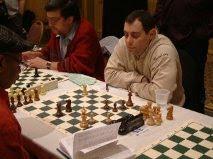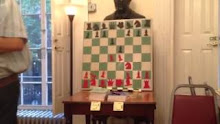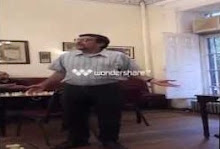Chess is king for the Prestia brothers
Wading through a sea of soccer balls, chessboards, model rockets, video games and toys in the playroom of their Lloyd Harbor home, the Prestia boys pondered a question: What do they want to be when they grow up?“A paleontologist!” declared Sebastian, pronouncing the 14-letter word with impressive precision for a 6-year-old. “I like dinosaurs.”
“A physicist,” said Frankie, 8. “I love space.”
“A surgeon and a lawyer,” said oldest brother Paris, 10.
Rosanna, their mother, laughed at the precocious responses. “Doesn’t anyone want to be a grandmaster?” she asked.
Paris looked up from the chessboard, where he was engaged in yet another impromptu match with one of his siblings.
“Is that even a job?” he asked.
An excellent question.
“It can be,” said seven-time U.S. women’s champion and grandmaster Irina Krush of Brooklyn. Krush, , 32, is a chess player and coach and works with the Prestia boys — avid chess players who, at very young ages, have already achieved much in the so-called Game of Kings — at the famed Marshall Chess Club in Manhattan, which produced grandmaster Bobby Fischer. “Plenty of people who have become grandmasters moved on to do other things in other fields, like finance or computer programming,” she added.
“Plenty” is a relative term, as only 86 Americans still living have attained the title of grandmaster, according to the U.S. Chess Federation. And although there are people who have achieved the title in their teens, becoming a grandmaster — often described as a sort of a “doctorate of chess” — is a product of long years of study and high performance in competitions.
There are some in the chess world, including Krush, who think all three Prestia boys have what it takes to join those elite ranks, should they choose. Earlier this summer, Sebastian was ranked the No. 1 6-year-old player in the country by the federation (out of 1,746 players of that age ranked by U.S. Chess). Frankie was ranked ninth in his age group, and Paris is in the top 30 nationally.
The rankings change monthly, based on tournament play, and as of September, Sebastian was ranked third in his age group; Frankie was 10th, and Paris was 53rd.
“All three of them are very advanced for their age,” Krush said, although she believes that Sebastian may have the most potential, in part because as the youngest he has had the benefit of playing against older competitors (his two brothers) on a daily basis. “For him, the door is totally open,” Krush added.
While the boys work hard at chess, they also seem to have inherited a talent for the game: Their father, Frank, was an accomplished player as an adolescent, although playing chess for him fulfilled a very different role than it does in the life of his sons, who see it as challenging fun.
Frank Prestia, 45, grew up in Roslyn in the 1980s, the son of Italian immigrants. He played, he said, because he believed proficiency at the game could help shatter some stereotypes that he felt keenly as a teenager.
“I didn’t have to be Vinnie Barbarino or the Fonz,” he said, referring to two notable Italian-American TV characters of the 1970s. “I could be someone intelligent.”
The image of Italian youths as little more than leather-jacketed hoodlums or class clowns (a la John Travolta and Henry Winkler’s characters in “Welcome Back, Kotter” and “Happy Days,” respectively) was still a pervasive one at the time. Prestia’s chess-playing ability helped give him the confidence to overcome that.
“Because I could beat the smartest kids in chess, I felt I could compete with them in academics as well,” he said.
Which he did: Prestia went on to the State University of New York in Geneseo, becoming the first in his family to attend college. He majored in philosophy and while there, also raised money to start a chess club that is still active on the campus. He later graduated law school at St. John’s. He met wife Rosanna, who grew up in Boca Raton, Florida, in an early internet-era chat room in 1998. “We talked about Greek philosophers,” said Rosanna.
Taking up the game
When Paris was 7 and came home from school one day with a chess set, excited by the idea of knights and castles, his father explained to him the basics of the game, but was wary of further encouragement.
“I didn’t want him to do it because I did it,” he said. “I didn’t want to pigeonhole him.”
The boys seemed to love the game, however, and when at their insistence their father enrolled them in a local youth chess group, the Smithtown Chess Nuts, in early 2014, their talent was quickly recognized by club founder Harold Stenzel.
“Those boys improved so quickly, they kind of outgrew me” and the Chess Nuts, Stenzel said.
“He recommended to us that we bring Paris and Frankie to a chess tournament,” Frank Prestia said. “I was firmly against it, but Harold kept recommending it, and Paris and Frankie really wanted to play, and they convinced Rosanna.”
The boys took more advanced lessons at the Long Island ChessMates centers in Stony Brook and Syosset, and this past January began studying with grandmasters Giorgi Kacheishvili and Krush at the Marshall Chess Club. Their class is on Monday evening. In addition, the boys — who attend the private Lloyd Harbor School, for students in grades 2-6 — practice the game daily.
Things change, though, when a match looms: the evening before a competition is chess-free. “The night before, we just do what we want to do,” Paris said. “We try to relax. We play Ping-Pong, we watch movies and TV.”
On the day of a match, the boys’ attention turns to mental preparation. “I’m thinking about what my opening is. And thinking about what [the opponent] might do,” Frankie said, adding that he has “played a bunch of people a bunch of times,” so he has some familiarity with opponents on the other side of the board and their style of play.
Still, practice and studying are a must. “I like the studying,” Paris said. “It’s good to learn to get better.”
“I don’t think it’s that fun,” Frankie retorts. “But if you don’t study and practice you don’t play, and that’s the most exciting part.”
Victory has its place, too.
“I like winning and getting trophies,” Sebastian said. “And seeing my rating going up.”
And there’s one other thing: “I like solving puzzles in chess,” Sebastian said.
According to Ohio State University research psychologist Joanne Ruthsatz, having three children in one family who are exceptional performers in the same discipline is “very uncommon.” Ruthsatz is co-author of a new book, “The Prodigy’s Cousin,” and while she agrees with Frank and Rosanna Prestia that showing their children the value of hard work and practice is important, ultimately, she said, talent wins out.
“Do I think their practice helps?” said Ruthsatz, who has interviewed and studied dozens of prodigies in various fields. “Definitely. Do I think any child could do what they do in chess, even with millions of hours of practice? No. I wanted to be Barbra Streisand and I love to sing . . . but no way.”
Jean Hoffman, executive director of the U.S. Chess Federation, the game’s national governing body, said the Prestias are among a growing number of outstanding young American players.
“We’re seeing record-setting achievements by our young players,” she said. “Across the board, they’re getting younger, getting higher ratings at a young age.”
Tournaments, trophies and time for tennis
This past summer, the Prestias competed in more than a half dozen tournaments, from Windsor, Canada, to Nashville, Tennessee, as well as in local competitions. Though chess has been an important focus, their parents have also tried to make sure the siblings enjoyed some of the kind of summer activities many Long Island children their age would: This past summer, the boys also attended camp, took tennis lessons and went swimming and kayaking.
Clearly, though, they enjoy the game. On a weekday afternoon in late August, Paris and Sebastian were eager to show off their skills as they faced off against each other over one of the many chessboards in their home. “I know how he plays,” said Paris, with the wisdom of the older brother, “so I’m doing a special thing against him.”
What that “special thing” is — a gambit to trap the opponent’s king in a series of moves known as the Mating Net — might be difficult for nonplayers to even conceptualize. “Chess is not about thinking a couple moves ahead,” said their father, watching the boys play. “You have to be thinking seven or eight moves ahead.”
In the time it took Frank Prestia to explain this to a chess novice, Paris had snared his brother in the Net and the game was over. The boys’ excitement then shifted to showing off what they said is the best thing about chess.
“Trophies!” they roar in unison.
Here, they are indeed similar to most Long Island children, eager to add to the hardware accrued from soccer or flag football or Little League. And not unlike most siblings, they are competitive with each other as to who has the most, a debate that is settled on this day only by counting the trophies that cram the bookshelves in each of the boys’ rooms. For the record, as of late August, Paris has 35, Frankie has 26 and Sebastian has 22 — a deficit he attributes to the fact that “they’re older.”
Rosanna Prestia said chess gives her sons “focus and discipline.” At that very moment, two of her children, already on to another game, get into a loud argument about who checkmated who first. “Hopefully,” she added with a grin.
For those serious about chess
Chess has a long history on Long Island, and among its enthusiasts is Harold Stenzel, president of the Nassau Chess Club, a group he said has been active since at least 1950.
Stenzel, 63, of Sayville, took up competitive play after the widely publicized Bobby Fischer-Boris Spassky match in 1972. “It was on TV three days a week,” Stenzel recalled.
The Nassau Chess Club meets Mondays in Mineola from 7 to 11:30 p.m. at First Presbyterian Church, and also holds frequent tournaments. Stenzel said attendance averages 50 to 60 people of all ages.
Neal Bellon of East Meadow is director of the Long Island Chess Club, the local affiliate of the U.S. Chess Federation, which he said has about 40 active members. Bellon, 44, began playing seriously 20 years ago. “I wanted to do more than just play at my kitchen table,” he said, noting that tournament play requires greater time and commitment. “That’s when I started playing competitively.”
Lalit Balwani of Holtsville has made that leap to tournament play. Balwani, 39, grew up playing chess in his native India, then picked it up again when he introduced his daughter, then almost 6, to the game just over a year ago. Now he plays with the Long Island Chess Club. “It’s fun,” Balwani said. “For 1½ hours or so, you concentrate on this one thing. I think it does a lot of good for you.”
The game also teaches humility, he said. “You get to play with all ages,” Balwani said as he recalled one of his first tournaments with the club. “I was playing a girl, she was 8 years old. And she beat me!”
*****
For parents and children interested in chess, visit chessli.org, a website started by the Prestias that lists all scholastic chess classes and locations on Long Island, plus a calendar of local and regional tournaments.
— John Hanc





























